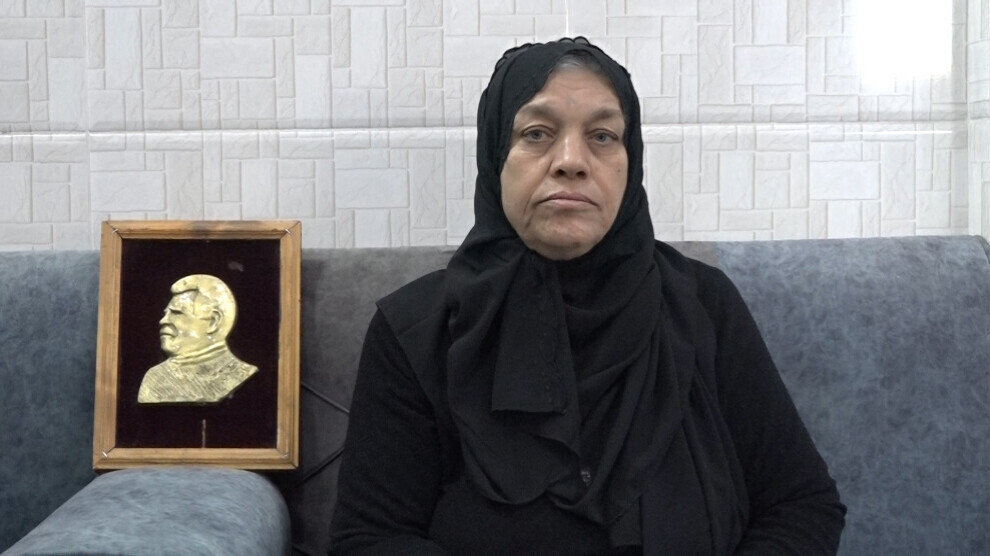From Frontline Work to Women’s Organization: A Journey of Struggle
Asma Murad, a Kurdish activist, dedicated her life to fighting oppression and marginalization. She has continued her work in organizing women and advocating for the freedom of Leader Abdullah Öcalan.

By Zainab Issa
Karki Laki — Before the Rojava Revolution began in the Autonomous Administration of North and East Syria, the Kurdish people worked steadfastly on their land, defying the former Syrian regime. When the revolution began — led courageously by women — women’s roles became increasingly visible in all areas of life. They took the lead in political, military, cultural, economic, and artistic fields.
Among the mothers who struggled for many years against the former Syrian regime stands Asma Murad, from the town of Karki Laki in Qamishlo, North and East Syria. To this day, she continues her struggle through women’s organization and the defense of Abdullah Öcalan’s freedom, dedicating her life to activism and grassroots work.
The Beginning of Her Involvement in the Freedom Movement and Discovering Öcalan’s Philosophy
Asma Murad recounts how she joined the Freedom Movement:
“In 1988, I became familiar with Leader Abdullah Öcalan’s philosophy. Since then, we worked under the umbrella of the Freedom Movement. Two years later, I joined the frontline work and spent many years in struggle and resistance. We used to move from one house to another to provide support and form organizational groups. During summer, we worked together in the fields. Despite the hardships, it felt like going to battle — because we believed that this movement would bring us the freedom we longed for.”
She continued:
“At that time, the former Syrian regime forbade us from giving Kurdish names to our children or using them at work. We were deprived of even our most basic rights, and the regime continued to suppress the Kurdish people. That’s why we turned to secret frontline work to gain our freedom and reclaim our rights. We would listen to Leader Öcalan’s speeches and gather in the evenings at the Martyr Mahsum Korkmaz Academy to hear his words. Despite the harshness of those days, they carried a unique beauty — every step we took toward organization gave us strength and an unbreakable will.”
From Prison to the Fields of Struggle: An Unyielding Will
Speaking about her first meeting with Abdullah Öcalan in Lebanon, Asma Murad said:
“On August 15, 1991, we went to the leadership area in Lebanon, where many people had gathered from different regions, from Endiwer to Kobani. On the first day, we didn’t see Leader Öcalan, but on the second day, we met him. He spoke to us for hours about the importance of women’s organization and their role in the struggle. After that, we returned home with stronger determination and greater willpower. Before meeting him, we visited three houses a day; afterward, we began visiting ten. Our work pace increased remarkably.”
She added:
“We continued our struggle until 2004, when the ‘Star Union’ conference was supposed to be held in the Mountains of Freedom, but it was postponed due to the March 12 uprising. During that time, my sister Ayhan and I were arrested by the former Syrian regime. We spent time in prison, and after our release, we faced great difficulties because many people now recognized us, making our work even harder. Once again, the regime prevented us from continuing our activities. We were re-arrested and taken to Hasakah, where we remained until our trial, after which we were transferred to the prisons of Damascus and Aleppo. Despite all that, we made a vow — to leave prison stronger and continue our struggle with even greater determination. Prison would never be a barrier to our freedom.”
Freedom Begins with Women’s Will
Asma Murad remained active in the struggle from the early years until the Rojava Revolution began. She continues her activism today through her involvement in the Women’s House. Reflecting on her journey, she said:
“We continued our frontline work until the Rojava Revolution broke out. After that, I joined the Women’s House. In the beginning, we used to call the revolution the ‘Arab Spring,’ until Leader Öcalan sent us a message saying, ‘This is not just the Arab Spring — it is the Spring of Peoples. Therefore, all communities must take part and unite in the spirit of brotherhood to build a democratic homeland.’”
She also highlighted how the former Syrian regime sowed divisions among peoples:
“It spread hostility between Kurds and Arabs. But today, our blood has mixed — we work together as one spirit. It’s not only the Arab components; even comrades from outside Syria are here with us, because they have come to know Leader Öcalan’s philosophy and see in him a leader of humanity and peace.”
She concluded by affirming:
“We will always remain at the forefront — standing behind the fighters, refusing to be silenced. We will continue the struggle until our leader is free.”
